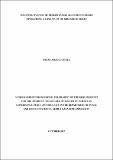The Effectiveness of Humanitarian Agencies on Relief Operations: A Case Study of Juba South Sudan

View/
Date
2017Author
Lusiola, Oscar Amadi
Type
ThesisLanguage
enMetadata
Show full item recordAbstract
Humanitarian aid represents a commitment to support vulnerable host populations that have experienced a sudden emergency, requiring ongoing assistance to maintain or improve their quality of life. The delivery of effective and sustainable aid within the fast-changing world continues to present serious challenges. The severity of humanitarian crisis in South Sudan calls for immediate identification and resolution of the factors challenging the effectiveness of humanitarian agencies on relief operations in South Sudan. The overall objective of the study was to examine the factors hindering the effectiveness of humanitarian agencies on relief operations in South Sudan. In order to achieve this, four specific objective were explored. They include ; the role of inter relations among humanitarian relief actors in juba, mode of operations of humanitarian relief actors, donor conditions and the challenges faced in humanitarian aid delivery. The study took place between April 2017 and May 2017. The researcher targeted field officers of Sudan NGO forum member organizations, refugees at Juba UN camp and the south Sudan directorates at the ministry of social services. Descriptive research design was used in the study. The sample size was 145 respondents. The researcher managed to collect data from 109 respondents resulting in a response rate of 75%.This study utilized both primary and secondary data. Primary data was collected using an interview guide and questionnaires; secondary data was mainly used during the literature review process. This study established mode of operations of humanitarian agencies, donor conditions and interrelations among main actors of humanitarian relief have a significant impact on the effectiveness of humanitarian agencies on relief operations. Additionally, also established is the existence of a number of challenges in relief operations chief of which is the political leadership in South Sudan and lack of an entry point for negotiation with the government among stakeholders. The study recommends involvement of all stakeholders in humanitarian relief operations, enhance their own fund mobilization capacity and effectively and efficiently implement program activities to enhance accountability. It is imperative that for the governments to accommodate the efforts of humanitarian agencies and support relief operations.
Publisher
Africa Nazarene University
